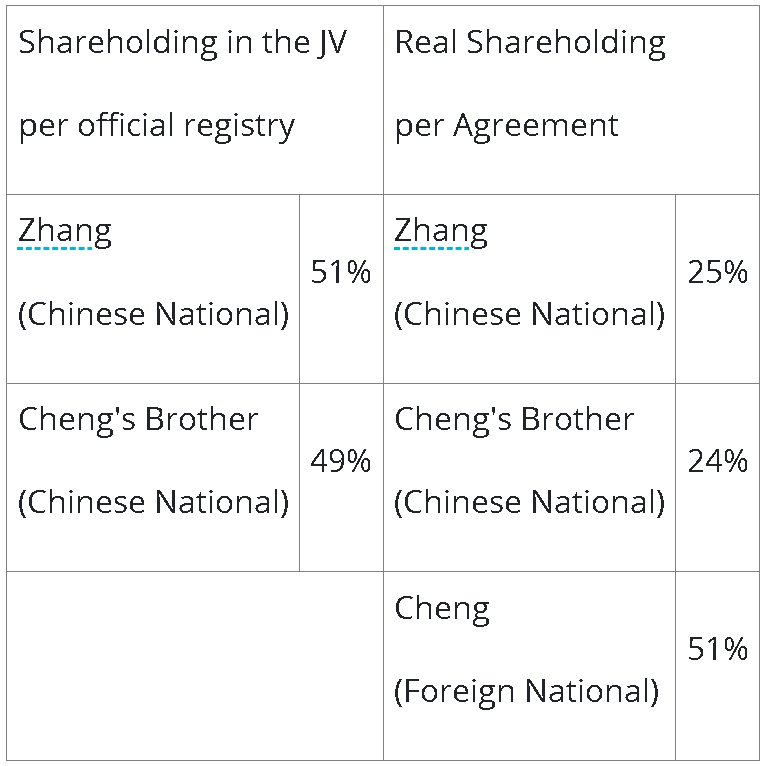The reform of China's foreign investment regime came into full effect on January, 2020. Article 42 of the Foreign Investment Law abolishes previous corporate governance mechanisms, which werebased on the restricted Joint Venture Laws outlook.It provides for a 5 years commissioning period requiring all foreign invested corporations incorporated under the joint venture laws to adapt and modernize their corporate governance structure.1 This stipulation requires millions of joint ventures to negotiate their shareholders agreements.
On December 2019, China's Supreme People's Court issued a judicial interpretation concerning the application of foreign investment law, according to the judiciary should not regard non-compliance with previous policies as detrimental while deciding disputes between shareholders.2
A similar question was recently decided by the First Intermediate Court in Shanghai in the matter of Zhang v. Cheng,3 confirming rights of dormant shareholder in a foreign invested enterprise.
This recent decision signifies China's commitment to a de-novo application of the foreign investment regime, disregarding non-compliance with previous restrictions while determining the respective rights of parties.
Case Note Zhang v. Chen as an example for Disputes between Foreign Dormant Shareholders and Local shareholders in a JV.
On May 14, 2020, the First Intermediate People's Court of Shanghai, sitting as the court of appeal, confirmed the rights of a foreign shareholder, Chen, an American national, as a dormant shareholder, in a joint venture founded by Chen and Zhang about ten years ago.
The erstwhile Law of the People's Republic of China on Chinese-Foreign Equity Joint Ventures stipulated that foreign parties cannot set up a joint venture company with a Chinese natural person in China. This legal hurdle was often circumvented by various entrustment arrangements with third parties, creating "dormant shareholders" . The reform of foreign investment regime in China lifted such anachronistic requirement and allows parties with maximum flexibility to decide the identity of the shareholders. The fate of previously incorporated joint ventures, with dormant foreign shareholders, remained so-far unclear. The case of Zhang v. Cheng, discussed herein, is a typical scenario reflecting this phenomenon.
According to the factual scenario described in the judgement, On 2009, Mr. Cheng, who is an American national and Mr. Zhang, who is a Chinese national, founded in China a trading, import and export company. Due to the legal restriction that prevented foreign nationals to directly establish a joint venture. Mr. Cheng entrusted his brother, a Chinese national to hold the shares in the company founded by Cheng and Zhang. The figure below describes the shareholding arrangements in Zhang v. Cheng.
Table 1: shareholding structure in Zhang v. Cheng, adapted from the case by the author on the basis of the facts described in the judgement
Mr. Zhang was responsible for the operations of the JV in China, reporting Mr. Cheng on a regular basis on the various aspects of the operation of the JV, as well as plans for dividend declarations. On October 29,2012, three of them made another shareholder agreement, which states the Junda Company shall acquire 100% equity of a company called Chaoyue, the shareholding of three of them shall be Cheng takes 51%, Zhang takes 25% and Cheng's brother takes 24%. On August 6, 2018, the JV, issued a capital contribution certificate, which states that Mr. Cheng has paid CNY 510,000 to the company as capital contribution back in 2009, equivalent to 51% of the shareholding in JV. Later, Mr. Cheng requested Mr. Zhang to transfer additional 26% of the equity to his brother, as Mr. Zhang is just a nominee shareholder for such equity in the Chinese company. Mr. Zhang disagreed and claimed he holds 51% of the equity in the Chinese Company.
At the first instance, the court agreed with the claimant, Mr. Cheng, disregarding previous legal restrictions and observing the intent of the parties through a series of agreements and correspondence between the parties. The second instance at the intermediary level, confirmed the first instance decision and rejected the appeal.
Significance of the Zhang v. Cheng
Although Chinese legal system follows the civil law tradition, and therefore, the role of legal precedent is limited, the current trend to emphasize rule of law made millions of Chinese judgements available online, and they can be used as reference. The decision of the courts in Shanghai is of significance.
Before the new Foreign Investment law came into effect, the Law of the People's Republic of China on Chinese-Foreign Equity Joint Ventures did not prevent foreign party from forming an equity joint venture with Chinese parties, however, Chinese individual was not allowed to be the party to form the joint venture. With the repeal of this old law, the new Foreign Investment Law has lifted the restriction that Chinese individual cannot be a party to aChinese-Foreign equity joint venture enterprise.Therefore, previous entrustment arrangements became unnecessary.
In the process of transforming corporate structure from the old joint venture law system, foreign nationals' rights are secured by Chinese courts. The former illegality is not reviewed as a critical factor while determining the respective rights of the parties, once the legal restriction has been lifted. This is an important case to note since according to Chinese law, such disputes are governed by Chinese law, and without a binding prioragreement on arbitration, should be referred for adjudication atcourts.[4]
It is pertinent to note that, while deciding the case, the Court contacted relevant administrative authorities and confirmed that the JV, following its modification to a Company's scope of business does not fall into the negative list prescribed by the central government. Thus, JV converting their corporate governance structure to a local company should observe the current limitation on foreign investors scope of activities.
Footnotes
1 References
Zhonghua Renmin Gongheguo Waishang Touzi Fa[Foreign Investment Law of the People's Republic of China](promulgated by Standing Comm. Nat'l People's Cong., Mar. 15, 2019, effective Jan. 1, 2020): " Article 42 This Law shall come into force on January 1, 2020, upon which the Law of the People's Republic of China on Chinese-foreign Equity Joint Ventures, the Law of the People's Republic of China on Wholly Foreign-Owned Enterprises, and the Law of the People's Republicof China on Chinese-foreign Cooperative Joint Ventures shall berepealed.
Foreign-funded enterprises formed under the Law of the People's Republic of China on Chinese-foreign Equity Joint Ventures, the Law of the People's Republic of China on Wholly Foreign-Owned Enterprises, and the Law of the People's Republic of China on Chinese-foreign Cooperative Joint Ventures before this Law comes into force may maintain their original business forms, among others, for five years after this Law comes into force. The specific implementing measures shall be developed by the State Council."
2 Judicial Interpretation on Foreign Investment Law (insert full reference)
Interpretation of the Supreme People's Court on Several Issues concerning the Application of the Foreign Investment Law of the People's Republic of China, Date Issued:12-26-2019 Effective Date:01-01-2020. "Article 2 Where a party to an investment contract formed in a field outside of the foreign investment access negative list as prescribed in Article 4 of the Foreign Investment Law claims that the contract is void or has not become effective on the ground that the contract has not been approved by or registered with the relevant administrative department, the people's court shall not sustain such claim.
Where an investment contract prescribed in the preceding paragraph is signed before the implementation of the Foreign Investment Law but the people's court has not rendered an effective judgment duringthe implementation of the Foreign Investment Law, the validity of thecontract shall be determined according to the provisions of the preceding paragraph."
3 Zhang v. Cheng, available at:https://www.chinacourt.org/index.php/article/detail/2020/05/id/5221078.shtml
4 Law of the People's Republic of China on Choice of Law for Foreign-related Civil Relationships, (Art. 14: "The laws at the locality of registration shall apply to such items as the civil rights capacities, civil acts capacities, organizational institutions, rights and obligations of shareholders, etc. of a legal person and its branch. If the main business place of a legal person is inconsistent with the locality of registration, the laws of the main business place may apply. The main business place of a legal person shall be its habitual residence.



 2023-08-16 20:44:05
2023-08-16 20:44:05.png) Qin Li
Qin Li Previous
Previous
.png)




